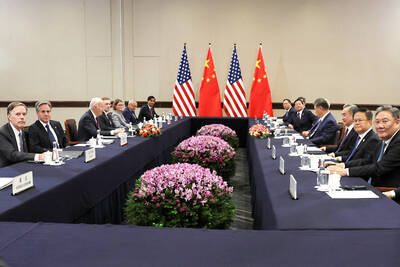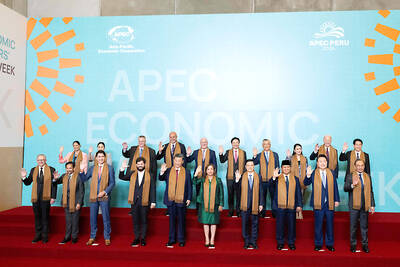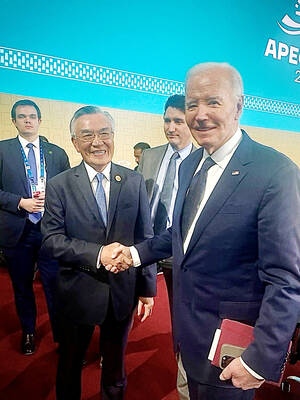A close aide to Saddam Hussein says the Iraqi dictator did in fact get rid of his weapons of mass destruction but deliberately kept the world guessing about it in an effort to divide the international community and stave off a US invasion.
The strategy, which turned out to be a serious miscalculation, was designed to make the Iraqi dictator look strong in the eyes of the Arab world, while countries such as France and Russia were wary of joining an American-led attack. At the same time, Saddam retained the technical know-how and brain power to restart the programs at any time.
US defense officials and weapons experts are considering this guessing-game theory as the search for chemical, biological and nuclear weapons continues. If true, it would indicate there was no imminent unconventional weapons threat from Iraq, an argument US President George W. Bush used to go to war.
Saddam's alleged weapons bluff was detailed by an Iraqi official who assisted Saddam for many years. The official was not part of the national leadership but his job provided him daily contact with the dictator and insight into the regime's decision-making process during the past decade and in its critical final days.
The official refused to be identified, citing fear of assassination by Saddam's paramilitaries who, he said, remain active throughout Iraq. But in several interviews, the former aide detailed what he said were the reasons behind Saddam's disinformation campaign -- which ultimately backfired by spurring, rather than deterring a US invasion.
According to the aide, by the mid-1990s "it was common knowledge among the leadership" that Iraq had destroyed its chemical stocks and discontinued development of biological and nuclear weapons.
But Saddam remained convinced that an ambiguous stance about the status of Iraq's weapons programs would deter an American attack.
"He repeatedly told me: `These foreigners, they only respect strength, they must be made to believe we are strong,'" the aide said.
Publicly Saddam denied having unconventional weapons. But from 1998 until 2002, he prevented UN inspectors from working in the country and when they finally returned in November, 2002, they often complained that Iraq wasn't fully cooperating.
Iraqi scientists, including those currently held by the US military, have maintained that no new unconventional weapons programs were started in recent years and that all the materials from previous programs were destroyed.
Both Bush and British Prime Minister Tony Blair have come under fire in recent weeks as weapons hunters come up empty handed and prewar intelligence is questioned.
Before the invasion, the British government claimed Saddam could deploy unconventional weapons within 45 minutes. The Bush administration insisted the threat was so immediate that the world couldn't afford to wait for UN inspectors to wind up their searches. Despite the warnings, Iraqi troops never used such weapons during the war.
US intelligence officials at the Pentagon in Washington, who spoke on the condition of anonymity, said some experts had raised the theory that Iraq put out false information to persuade its enemies that it retained prohibited chemical, biological and nuclear weapons programs.
"That explanation has plausibility," said Robert Einhorn a former assistant secretary of state for nonproliferation. "But the disposition of those missing weapons and materials still has to be explained somehow."
Iraq's claims that it destroyed stockpiles of chemical and biological weapons materials could never be verified by UN inspectors who repeatedly requested proof.
However, UN inspectors, who scoured Iraq for three and a half months before the war, never found any evidence of renewed weapons programs.
"The longer that one does not find any weapons in spite of people coming forward and being rewarded for giving information, etc., the more I think it is important that we begin to ask ourselves if there were no weapons, why was it that Iraq conducted itself as it did for so many years?" Hans Blix, the former chief UN weapons inspector, told AP in June.

ONE LAST TALK: While Xi said that Taiwan was a ‘red line,’ Biden, in what is likely his last meeting with Xi as president, called for an end to China’s military activity around Taiwan China’s military intimidation and economic coercion against Taiwan are the main causes of tensions that are destabilizing peace in the Taiwan Strait, Taipei said yesterday while thanking US President Joe Biden for expressing Washington’s firm stance of maintaining peace and stability in the region. Biden and Chinese President Xi Jinping (習近平) met on Saturday for their third meeting and their first talks in seven months on the sidelines of the APEC forum in Lima, Peru. It was likely Biden’s last meeting as president with Xi. During their conversation, Biden reiterated the US’ opposition to any unilateral change to the “status quo” from either

Taiwan would participate in the 2026 APEC summit to be hosted by China after Beijing promised it would ensure the personal safety of attendees, Taiwanese national security sources said yesterday. The APEC Leaders’ Machu Picchu Declaration announced yesterday said that China would host the APEC summit in 2026. Beijing proposed hosting the summit shortly before this year’s gathering began on Friday, a national security official said, speaking on condition of anonymity. Many APEC members expressed concerns about China hosting the event and said that prior communication over the decision was insufficient, the official said. Taiwan brought up concerns about legal “guidelines” China announced in

SUPPORT: Arms sales to NATO Plus countries such as Japan, South Korea and Israel only have to be approved by the US Congress if they exceed US$25m The US should amend a law to add Taiwan to the list of “NATO Plus” allies and streamline future arms sales, a US commission said on Tuesday in its annual report to the US Congress. The recommendation was made in the annual report by the US-China Economic and Security Review Commission (USCC), which contained chapters on US-China economic and trade ties, security relations, and Taiwan and Hong Kong. In the chapter on Taiwan, the commission urged the US Congress to “amend the Arms Export Control Act of 1976 to include Taiwan on the list of ‘NATO Plus’ recipients,” referring to

MEET AND GREET: The White House, which called the interaction ‘just a handshake,’ did not immediately respond to a request for comment on whether Biden planned to visit Taiwan’s envoy to the APEC summit, Lin Hsin-i (林信義), on Friday invited US President Joe Biden to visit Taiwan. During the APEC Leaders’ Informal Dialogue, Lin, who represented President William Lai (賴清德) at the summit, spoke with Biden and expressed gratitude to the outgoing US president for his contribution to improving bilateral ties between Taipei and Washington over the past four years, the Ministry of Foreign Affairs said. Lin and Biden exchanged views during the conversation, with Lin extending an invitation to Biden to visit Taiwan, it said. Biden is to step down in January next year, when US president-elect Donald Trump is